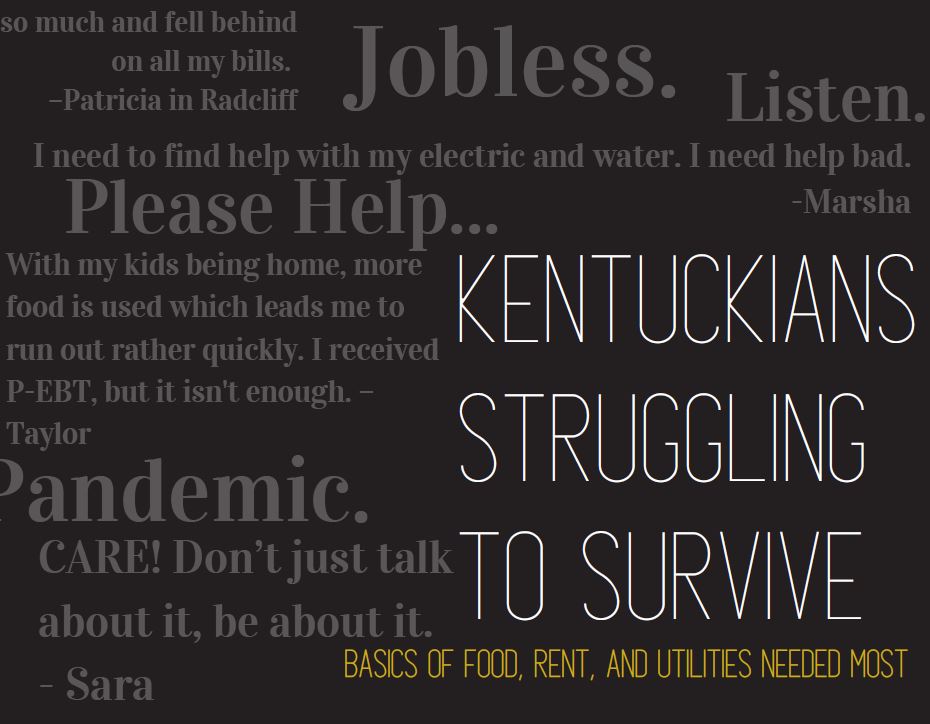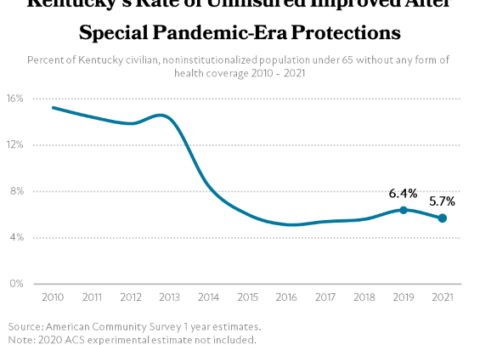Yesterday President Trump tweeted that he was ending Congressional talks on a critical new aid package. A new survey of Kentucky households illustrates that in the current absence of badly-needed expired or missing forms of aid, families are facing mounting food bills and hunger as well as trouble paying for electricity, water and rent.
According to the survey – conducted in late August/early September by the Southern Economic Advancement Project of 175 Kentuckians using Fresh EBT, a free app that helps SNAP participants track their benefit usage – 70% of respondents had trouble buying enough food, and food insecurity and job losses have been top challenges in the pandemic. Wage cuts and a complete or partial loss of work hours, paired with rising food prices and higher utility bills from being at home more often, are making it impossible for many to make ends meet. As one respondent, Patricia in Radcliff, put it, “[I’ve] lost so much and fell behind on all my bills.”
“Keeping the lights on, food on the table, and rent paid are the primary concerns of families right now. As the weather turns colder, how will people pay their heating bills?” Kentucky Center for Economic Policy, Policy Associate Jessica Klein asked. “As a policy research organization, struggling Kentuckians have been reaching out to us directly since the pandemic started to advocate for the appropriate economic policy response. The survey finding that 71% of respondents were concerned about COVID-19 support and relief reiterates what Kentuckians have been telling us in emails and calls for months: More aid is critical.”
The survey shows that relief provided to date in the pandemic has been crucial to getting families this far. Almost two-thirds said programs or assistance made a real difference for them and their family in managing the pandemic. Food assistance, unemployment insurance, stimulus checks and LIHEAP (help with utilities) were the forms of aid mentioned most often.
But the federal boost to unemployment insurance expired 11 weeks ago and a temporary program from the Trump and Beshear administrations will expire in a few weeks; boosts in food assistance have not reached all Kentuckians or been enough to accommodate rising food prices; and other forms of rent and utilities aid are very limited. “Unemployment and the extra CARES funds helped me manage my rent and other necessary bills. This month I’m not able to pay my rent because the help has lapsed,” Melissa in Jefferson County said. Nearly two-thirds of respondents were worried about having stable housing in the next two months.
Gaps in aid disproportionately harm Kentuckians of color. A large body of research shows that Black people were already pushed to the brink by policy choices before the pandemic, and are experiencing the most harmful health and economic impacts of COVID-19.
“The movement for Black lives has trained the nation’s eyes on how Black and brown Kentuckians face great barriers, are neglected when they are in need and even targeted when they fight for equity. The data is clear: households of color have been more likely to experience food insecurity, unemployment, and lack of access to health care during COVID-19, and this survey only reinforces the imperative that Congress act now,” Kentucky Equal Justice Center Food Justice Fellow, Tyler Offerman said.
Despite the President’s actions, with two U.S. House proposals already passed, it is up to the Senate to agree to a package before leaving D.C.. It must include an increase in SNAP benefits, a restart to federal supplemental Unemployment Insurance payments to last until workers are back on their feet, a boost to Medicaid funding to keep people covered and healthy, aid to states to prevent more layoffs, and assistance for Kentuckians with their utilities and rent.
As respondent Audrey put it, “Families like mine are struggling very bad. Without [aid] we will not make it. Please, please get us the second stimulus check quickly and any other help possible.”
Read the survey report: “Kentuckians Struggling To Survive: Basics of Food, Rent, and Utilities Needed Most.”


